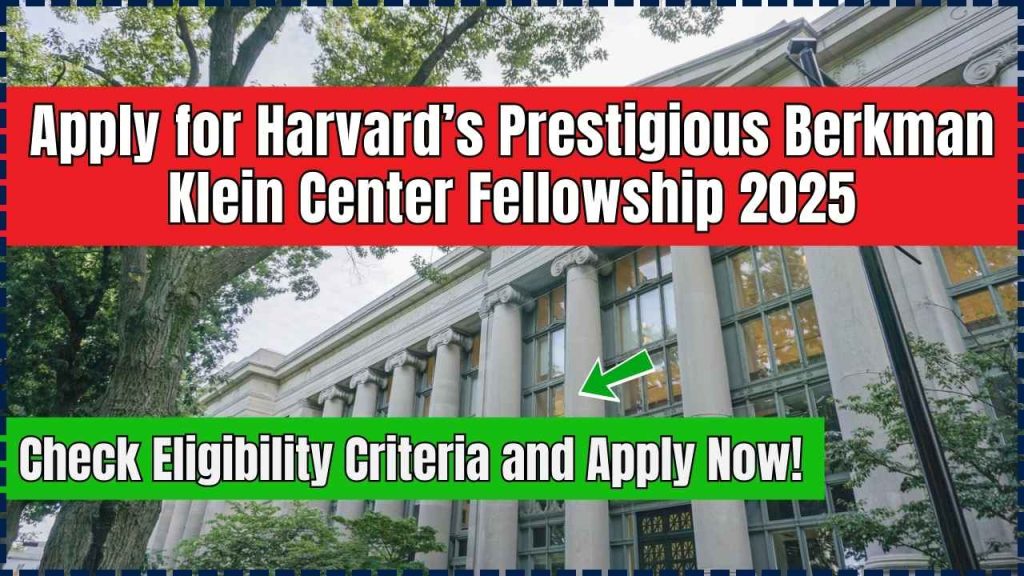Harvard’s Prestigious Berkman Klein Center Fellowship 2025: Are you a scholar, professional, or practitioner passionate about exploring how the internet, artificial intelligence (AI), and society intersect? Do you dream of working with Harvard experts to shape digital policy and technology’s future? Then the Harvard Berkman Klein Center Fellowship 2025 might be exactly what you’re looking for. This prestigious fellowship invites innovative minds from across the globe to contribute to vital discussions and research about our increasingly digital world.

The Berkman Klein Center (BKC) is internationally recognized for its interdisciplinary research that shapes tech policy, law, governance, digital ethics, and education. Fellows become part of a vibrant, intellectually stimulating community, working on projects that matter globally.
Harvard’s Prestigious Berkman Klein Center Fellowship 2025
| Key Information | Details |
|---|---|
| Fellowship Name | Harvard Berkman Klein Center Fellowship 2025 |
| Eligibility | Academics, post-doctoral scholars, non-academic professionals |
| Focus Areas | AI, Social Media, Internet & Society, Digital Ethics, Online Communication |
| Fellowship Duration | Sept 1, 2025 – Aug 31, 2026 |
| Location | Cambridge, MA (Harvard Law School Campus) |
| Stipend | Up to $75,000 (additional $10,000 if externally funded) |
| Official Website | cyber.harvard.edu |
The Harvard Berkman Klein Center Fellowship 2025 is more than a fellowship—it’s a once-in-a-lifetime experience to reimagine the future of tech and society from one of the most influential institutions in the world. Whether you’re exploring AI fairness, digital rights, or the politics of online speech, this is your chance to amplify your work with world-class support.
If you’re ready to join a global cohort of changemakers and contribute to critical research shaping the digital age, don’t wait. Applications close on April 30, 2025. Take this step toward academic and professional transformation.
What is the Berkman Klein Center Fellowship?
The Berkman Klein Center for Internet & Society at Harvard University is a leading global institution dedicated to exploring how technology and society intersect. Its core mission is to advance understanding and governance of the internet and emerging technologies. Fellows join to research, build tools, publish papers, and engage with peers and the public.
The fellowship is not just about research in isolation. It emphasizes collaborative exploration, encouraging fellows to challenge assumptions, test ideas, and co-create future-ready digital solutions. Whether you’re interested in the societal impacts of AI, how misinformation spreads online, or developing educational tools for better discourse, BKC is the place to engage.
Types of Fellowships Available in 2025
The 2025-2026 program supports three fellowship categories, tailored to professionals from academia, post-doctoral studies, or non-academic sectors:
1. Academic Fellows
- Designed for full-time faculty members (assistant, associate, or full professors)
- Ideal for those with a background in law, computer science, political science, sociology, or digital humanities
- Applicants must propose a research project and demonstrate a publication history related to AI, data policy, or digital communication
2. Post-Doctoral Fellows
- Open to candidates completing their PhD or other terminal degrees by September 2025
- Encouraged to propose a bold, novel research direction aligned with BKC’s current workstreams
- Strong applicants will show cross-disciplinary interests and readiness to participate in BKC events and outputs
3. Non-Academic Fellows
- For experienced professionals, activists, designers, lawyers, developers, and journalists
- Applicants must show evidence of leadership, innovation, or public engagement
- Ideal for those pursuing a sabbatical, career transition, or planning to scale a policy or tech initiative
Fellowship Themes & Workstreams
BKC structures its collaborative work around thematic workstreams, which are key research priorities:
AI Interpretability, Ethics, and Implications
Dive into the ethics of decision-making systems. How should we understand AI-driven choices? What happens when machines make moral decisions?
Agentic AI Protocols and Risk Mitigations
Create practical frameworks to reduce the risks associated with autonomous systems. Emphasis on transparency, governance, and fail-safes.
AGI Futurecasting and Policy Development
Explore possible futures involving Artificial General Intelligence. Develop policy suggestions, regulatory frameworks, and long-term safeguards.
Tech, Tools, and Practices for Improving University Discourse
Design digital solutions for healthier online academic discussion, reducing toxicity, and enhancing learning outcomes.
Safety Solutions for Social Media
Address misinformation, cyberbullying, algorithmic harms, and content moderation through practical interventions and tool development.
What Do Fellows Receive?
This is not just a title; it’s a transformative professional experience. Benefits include:
- Generous Stipend: Up to $75,000 for those without external support. Partial funding available too.
- Supplemental Grant: $10,000 top-up if you bring your own institutional or grant funding.
- Office Space: Workspace at the Harvard Law School campus, surrounded by interdisciplinary researchers.
- Resources: Access to Harvard libraries, events, faculty, and support teams.
- Mentorship: Work with leading researchers and practitioners across fields.
- Community: Join a cohort of 25-30 diverse fellows passionate about tech and society.
Who is Eligible to Apply For Harvard’s Prestigious Berkman Klein Center Fellowship 2025?
Eligibility is broad, encouraging global participation from different sectors. Here’s what they expect:
Academic Fellows:
- Full-time appointment at a higher education institution
- Demonstrated excellence in scholarship
- Alignment with one of BKC’s workstreams
- Commitment to interdisciplinary engagement
Post-Docs:
- Degree completion by September 1, 2025
- Emerging research agenda with future potential
- Eagerness to contribute to BKC community activities
Non-Academics:
- 5+ years professional experience
- Track record of thought leadership or advocacy
- Willingness to contribute to public discourse or open-source projects
Residency Requirement: What You Need to Know
Fellows must be physically present in Cambridge, Massachusetts from September 2025 to May 2026. This in-residence commitment fosters deeper connections, real-time collaboration, and spontaneous innovation.
While the summer months (June to August 2026) allow some flexibility, active participation is expected throughout the year. Fellows will:
- Join weekly community lunches
- Attend closed-door and public events
- Present their work-in-progress
- Collaborate on joint research and publications
How to Apply for the Harvard’s Prestigious Berkman Klein Center Fellowship
The application deadline is April 30, 2025, by 11:59 PM Eastern Time. Applicants should prepare and submit the following:
- Cover Letter (1–2 pages)
- State your interest in specific workstreams
- Share your motivation, background, and goals
- Curriculum Vitae (CV)
- Include education, job experience, key projects, and publications
- Project Proposal (2–3 pages)
- Explain your research question or goal, methodology, expected outputs, and relevance to BKC themes
Dreaming of a Neuroscience Career? Apply for the Simons Foundation Paid Fellowship!
Want to Advance Your Career? Apply for the 2025 Marie Sklodowska-Curie Actions Fellowship!
2025 Margaret McNamara Fellowship Grants: Find Out If You Qualify and How to Apply!
FAQs About Harvard’s Prestigious Berkman Klein Center Fellowship 2025
Do I need to be a U.S. citizen to apply?
No. International applicants are encouraged to apply. Harvard may assist with visa support, but legal U.S. residency during the program is mandatory.
Is affiliation with Harvard University required?
Not at all. Applicants from outside Harvard are welcome and make up a large portion of each fellowship cohort.
Can I apply while employed full-time?
Yes, but you must commit to in-residence participation. Taking a sabbatical or adjusting your work schedule is necessary.
Are there age limits or career stage restrictions?
No. Candidates are assessed on merit, vision, and impact, not age.
Can I collaborate with others on my project?
Absolutely. Collaboration is central to BKC. Joint proposals or interdisciplinary projects are welcome.











